

VOL. I NO. 4 REG NO. L5015 DELHI, THURSDAY OCTOBER 8, 1942
Allies Prepare For Burma Trek
By BILL McGAFFIN, ASSOCIATED PRESS WAR CORRESPONDENT
Somewhere in East India - Uncle Joe Stilwell has gathered together the survivors of the Chinese divisions who trekked through the mountainous jungle to India after the collapse of Burma and is grooming them with American training and equipment into elite corps which will one day drive the Japs into the sea.
The number of Chinese here must necessarily remain secret but for the discomforture of Hirohito's candidates for Harikiri it can be said that there are sufficient to form an important nucleus for a new striking force.
It was all a military secret until now. Disclosure came when correspondents were loaded into a plane and flown to this hilly strip of tiger country to see the camp in action. We were flown down in Brigadier General Clayton Bissell's own plane by his own pilot, Lt. C. J. Anderson.
THREE HEADMEN
The three headmen of the camp all marched out of Burma with Stilwell. They are Col. Frederick McCabe, commandant and head of the infantry section; Col. George W. Sliney, heading the artillery section, and Col. William H. Holcombe, running the S.O.S.
Once arrived we looked around the neat brick buildings that once housed Italian prisoners of war and then got into reconnaissance cars and set out to see how the Chinese are progressing with Uncle Joe's pet project.
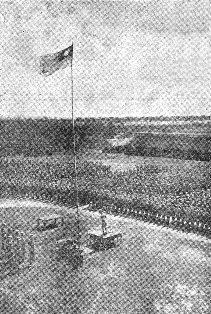 LT. GEN. JOSEPH W. STILWELL, commanding officer of the Chinese troops in India and commander of all American troops
in the C.B.I. Theater, made a speech in Chinese to the soldiers while he was on an inspection tour of a Chinese
training camp in eastern India.
LT. GEN. JOSEPH W. STILWELL, commanding officer of the Chinese troops in India and commander of all American troops
in the C.B.I. Theater, made a speech in Chinese to the soldiers while he was on an inspection tour of a Chinese
training camp in eastern India.
|
First stop was the hospital which is a most important cog since several hundred Chinese must be nursed back to health from malaria and tropical sores after their desperate march through the jungle. "They respond well to good treatment and food," said Major C. B. Warrenburg, in charge of the hospital. "They can eat an unbelievable amount of rice. Their rations are two pounds daily, plus mutton and vegetables washed down with their favorite drink, boiling hot water." Warrenburg said some had gained 15-20 pounds. He has the expert assistance of Major Gordon S. Seagrave, American Baptist Missionary in Burma, whose hospital unit and 32 Burmese nurses saw action with the Chinese in Burma along with British Friends Ambulance workers, and American medical officers and came out with Stilwell.
MALARIA PROTECTION
At sundown the patients are all clapped down under mosquito nets to keep malaria from spreading. They co-operate by feeding themselves with chopsticks from huge rice bowls. Warrenburg is also co-operating in training a Chinese medical corps unit in first aid and battlefield evacuation.
Next Col. Richard M. Sandusky took us in tow and showed us through the infantry section. We stopped first in a tommy gun classroom where a Chinese instructor was telling boys in his own language what he himself had learned only a few days before. This was the first halt in the "belt-line" system of teaching. It was explained by Corp. Wallace heath, supervising the class, as a system where the Chinese were put through learning step by step like parts on an assembly line until they came out full-fledged specialists.
The Americans are all learning Chinese under the guidance of Col. Hayden Boatner, in charge of Chinese language and customs. To date they know only a few words but both Americans and Chinese are picking up key phrases in each others' tongues. Chinese favorite is "O.K." Anticipate the day when Americans will talk Chinese exclusively but the language is not such a problem as one might think. "Most schools waste too much time talking," Sliney said. "We've made remarkable progress simply by policy demonstration which they imitate."
"READY ON THE RIGHT"
Next we saw men on the brenn gun line firing the only non-American weapons in the school under the direction of Lt. Albert Newton. On the rifle range Chinese who had been practicing only four days were plugging bulls eyes at 200 yards. Part of this prowess is perhaps attributable to the hillbilly who is the senior instructor. He is Sgt. Felix Southerland who has benn teaching American marksmanship methods.
These "pupils" are unique in that they have already seen battle. But they have not had weapons like this nor have they even had live ammunition for practice. They are now learning on the latest and best supplied by the United States through Lend-Lease. Their favorite weapon is the trench mortar. We watched a hotshot team learning to fire the improved American mortar under the coaching of Sgt. Samuel Carmell.
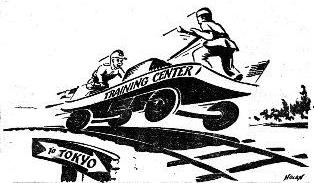
|
On down the line came Capt. Ralp B. Tilt, conducting the group firing Browning machine guns on simulated tank targets. Then we went to a field rented from the Indians who had moved out over a wide radius to allow artillery to do its stuff. Lt. Col. R. M. Cannon had the men fire a demonstration problem with pack howitzers - ideal weapon for China and Burma because it can be broken down to be carried on mule back where there are no roads.
SHELLS BURSTING
Moving on to the observation point we saw Chinese peering through "BC" scopes while Major Francis Hill, Major Edgar Ingmire and Capt. Sydney Sacerdote explained the objectives of shells that could be clearly seen bursting in the distance - neutralizing "enemy" machine gun nest and infantry command post.
Ten Chinese artillery officers flown down from Chungking to aid in the teaching have not missed a day of firing rain or shine during the monsoon, Sliney said.
Artllery units need trucks to supply them, Trucks need drivers. This is another function of the school. In the words of the chief instructor, Major Donald Maidt, and Major Joe Stephenson, in charge of the school. Chinese who have never driven anything more complicated than a wheelbarrow are being turned into drivers in two weeks' time. Idea is to teach them to drive in that time and let them get experience with a supervisor who rides with them.
One problem is getting Chinese with legs long enough to work pedals. They managed to get a group that averaged five feet six inches tall who make up in eagerness and retentiveness what they may lack in physical stature. "They lap it up," says Stephenson. Another course in the school teaches mechanics.
back in the mess hall we were told stories confirming this to be a real tiger country in which the training goes on. Two tigers were shot recently by Americans. Capt. David McConnell, former secretary to Senator Byrnes of South Carolina, got one with a .45 while another was bagged with an Army rifle by Pvt. Dale Jenson. Both shootings took place within a few miles of the camp.
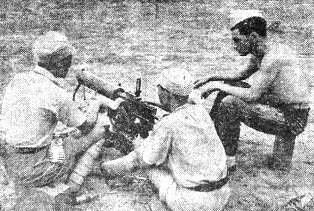 CORP. VINCENT FOLEY is the lad watching his Chinese chums chatter away on the Browning machine gun. Unfamiliar with
the gun, and being members of an army traditionally short of automatic weapons, the Chinese results were extraordinary.
CORP. VINCENT FOLEY is the lad watching his Chinese chums chatter away on the Browning machine gun. Unfamiliar with
the gun, and being members of an army traditionally short of automatic weapons, the Chinese results were extraordinary.
|
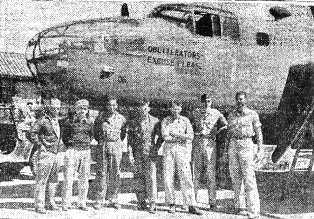 TOKYO TERRORS - These men all participated in the raid on Tokyo and are seen standing beside the type of plane they
used. They are now with the China Air Task Force and continuing to give the Jap a bad time.
TOKYO TERRORS - These men all participated in the raid on Tokyo and are seen standing beside the type of plane they
used. They are now with the China Air Task Force and continuing to give the Jap a bad time.
|
FOR GOD'S SAKE, S.O.S.
By SGT. ALBERT F. ABRAMSON, U.S. AIR FORCE.
Weapons - that's what we need - but definitely. We lay down a smoke-screen, Only a temporary aid. We form a scouting party, We engage lights. We creep slowly through the dark, and when we find an anwary enemy who has strayed from the fold, we pounce upon him. We demolish him. But what are a few when hundreds and thousands more take his place.
They surround us. Creeping up in the dark. Our morale is weakening. We don't have proper equipment to fight back. We're meeting them on their own ground which makes it harder.
First they strike suddenly and viciously from the fore. Then they attack us from the rear. Then they form a pincer movement and encircle us. What can we do? We can't advance. We can't retreat.
S.O.S., S.O.S. for God's sake send some citranella to keep these damn bed bugs off.
POONA GOONA
(Minutes of a meeting of the Queensway Beggars Protection Association)
The meeting was called to order by Quaralla Baballa Singh, a ruthless, hapless and footless beggar.
Quaralla Baballa Singh: No momma no poppa.
All: Are you kidding?
Quaralla Baballa Singh: Abdul! Stop picking Ismael's nose!
Abdul: I can pick Ismael's nose if he wants! I have no nose of my own and he has no hands of his own. We are a communal farm.
Quaralla Baballa Singh: Yesterday Ismael had two perfectly good hands.
Ismael: Well, I cut them off, smartly. It's my wife's fault.
Quaralla Baballa Singh: That reminds me, where is she?
Ismael: She cut off too much - may she rest in peace. But it was her fault that I had to cut off my hands. Remeber that beautifully wizened baby we had?
All: Very, very sad!
Ismael: She fed it.
All: Tsk Tsk!
Ismael: So I had to cut off my hands.
All: Naturally! Naturally!
Ismael: But it doesn;t work. Now I have to hire a boy to do the tugging at the Americans' coat sleeves. That costs money.
Quaralla Baballa Singh: His fee is stipulated in paragraph 4(a) of the Bylaws.
Ismael: Yes, but I don't even take in that much. So now I will have to cut off the hands of the boy and he will have to hire the coat-tugger, as it is written in the contract. Then let him learn that money doesn't grow on trees.
All: How right you are!
Quaralla Baballa Singh: It has come to my attention that there is a space of two feet along the way the Americans walk which is not occupied by one of us.
Ismael: Cut them off!
Quaralla Baballa Singh: You don't understand. I mean square feet. Feet of pavement.
All: Oh.
Quaralla Baballa Singh: Already represented along that, the gold coast of Delhi, there is a footless man and a headless woman, a motherless child and a childless mother. There is a woman with no teeth, and teeth with no woman, and old man who can't stand up and a young girl who can't sit down.
All: Very sad. Very sad!
Quaralla Baballa Singh: There are the brainless and the handless, the leprotic and the neurotic. I'm reaching the end of my rope.
Abdul: I have a suggestion. Someone could boil in oil on that spot. I boil very well in oil, but of course I'm busy with my noselessness.
All: Very sad. Very sad!
Quaralla Baballa Singh: A brilliant suggestion.
Ismael: Not very. You've forgotten something.
All: Yes, please?
Ismael: The British have cut off our oil.
All: No momma no poppa no petrol. Very sad!
Heroic Chinese March From Burma Told
By HERBERT MATTHEWS, WAR CORRESPONDENT, NEW YORK TIMES
An East India Camp - There is a story that can now be told of the retreat from Burma - of how the last Chinese division got out after hardships incomparably greater than suffered by other units.
The division had gone into action just after the evacuation of Toungoo and then got orders to retreat fighting its way back through Mandalay into China. A small part did fight its way through but the main body found the road blocked by Japanese near Lonkin.
The young general in charge detached a battalion to fight a holding action which it did successfully while he circled around northward still hoping to get up the Irrawaddy Valley. He was blocked again, however, and had to turn westward toward the Chindwin River and their troubles began.
CAUGHT BY MONSOON
Much time had been lost and the division had been slowed down by wounded and ill so the Monsoon rains caught them alone of the units that retreated from Burma. On May 14 at Singhalin Khamti they burned their trucks and started northward through almost trackless jungle hoping to reach a railhead in Assam.
For 20 days they struggled on without seeing a single human being. Trails vanished under torrential rains. Streams that ordinarily could have almost been jumped over became raging rivers overnight of even in the course of a few hours. It took the division two weeks to make one stretch natives had made in one day before the rains.
Bridges had to be built from the crudest materials, hills that seemed to be almost vertical had to be surmounted, mules died of exhaustion and men shouldered their burdens of trench mortars, machine guns and sick men.
GREAT LEECHES
Soldiers too died of exhaustion and often to lie down meant you'd never get up again. Leeches drained their blood by day causing great jungle sores from which many died. Big ants, mosquitos and other insects made sleep almost impossible despite utter weariness - and thos mosquitos were malarial so that few escaped the fever in the long run.
And through it all was the everlasting rain that rotted clothes, equipment and even guns, making the earth a quagmire through which now barefooted men floundered on, sustained only by their will to live.
"If a man has a strong desire for life," said the young divisional commander who told us his story, "he'll pull through almost anything because human spirit can conquer material obstacles."
Six days north of Singhalin Khamti their food gave out and still they struggled on for a whole week, lugging their mortars, machine guns and shouldering their rifles. No man came out without his rifle.
KEPT RADIOS
And they still had their radios which was why they were saved for at Taro when endurance was almost at an end American planes contacted them and dropped life-saving food. It took first-class reconnaissance, piloting and skillful calculation in dropping food but it was done and done again further north at Shingbwiyang. In all 400,000 pounds of food was dropped along the route.
On August 4, two months and 17 days after trucks were burned, three-fourths of the men who started reached the rail head in Assam. Even a group of girl students acting as propagandists or equivalent to political commisars came through with only a few deaths although those who survived are still in the hospital. One 13-year-old boy who ran away from home to join his elder brother in the army, came through but his brother died.
"Do you expect to see Burma again?" the general was asked. "We'll see Burma again alright," he replied, "as we go back through there on our way to China."
KNOW YOUR INDIA
Indians in the larger cities are great movie goers and they tend to take what they see more seriously than we do. Some of them will half expect you to be like Gary Cooper in "Sergeant York" or to look like Robert Taylor or some other soldier of the silver screen.
The influence of the movies works both ways. Some of us have strange ideas about India. You'll find that it is very little like the scenes in "Lives of a Bengal Lancer." For one thing, you don't get the heat and dust smells of India in an air-conditioned theater. And movie directors often take their ideas about India from Kipling.
Which is to say that the movies are about as much like real life in India as Abbott and Costello's shenanigans are like everyday activities in the U.S. Army.
SHARE IN FIGHT
In India your primary job is, of course, to share in beating the enemy wherever and whenever he can be found. Part of the enemy's attack in this war is the spreading of propaganda, some of it in the attempt to divide our allies and, for example, create distrust of America among the people of India.
Only a small percentage of Indians are able to read and write, so that they tend to believe what they hear and see. One of the best ways of counteracting enemy propaganda is action that people can see and appreciate. By your conduct in relations with the people you can do a great deal to maintain the reputation America and Americans already enjoy.
India is big and old. It is as large as all the countries of Europe, excluding Russia, put together and has a population of 389 million, about three times that of the United States. It has the highest mountains in the world, the hottest lowlands, the heaviest rains. The people are as varied as the terrain. There is a lot of difference between the tall, light-complexioned, raw-boned Pathan from the Northwest Frontier Provinces and the small, darker, wiry soldier from Madras in the south.
EUROPEAN STOCK
But all the people of India today belong to the same race as white skinned Americans do. Although many of them have dark skin color, every other feature shows that they belong to the same racial stock as the people of Europe. The people speak different languages (there are over two hundred languages in all), and have separate customs.
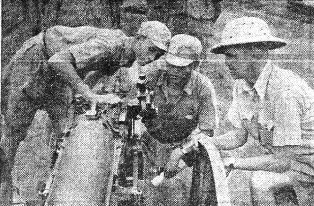 LT. COL. ROBERT M. CANNON is one of the "No. 1" artillery experts at the Chinese training camp where our Chinese
allies are looking very, very good with the cannon.
LT. COL. ROBERT M. CANNON is one of the "No. 1" artillery experts at the Chinese training camp where our Chinese
allies are looking very, very good with the cannon.
|
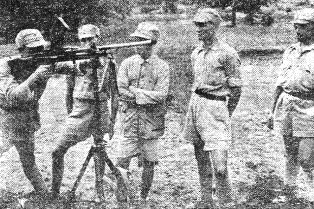 THE BRENN GUN used as an anti-aircraft weapon is tried by the Chinese. The tripod is only used for defense against
enemy planes.
THE BRENN GUN used as an anti-aircraft weapon is tried by the Chinese. The tripod is only used for defense against
enemy planes.
|
Sino-American Friendship
The Chinese-American training camp publicised for the first time in this issue is the finest example here in the Far East of what Allied co-operation can and should be. At this camp thousands of Chinese, including several officers of high rank, have come under the command of General Stilwell and his American representatives.
This might normally cause a great deal of friction. Any national might resent being commanded by the officers of a foreign army. Yet such is the good-will at this camp between the Americans and the Chinese that training has progressed for some weeks now with no difficulties what-so-ever.
The fact that Americans are training Chinese is no reflection on Chiang's men. It is merely a matter of training them in the use of weapons familiar to us but strange to them. With weapons with which they are familiar, such as the trench mortar, the Chinese have shown themselves marksmen of the highest type and according to an American mortar instrauctor, "know a damn site more about this weapon than I do."
When the first artillery firing was conducted before the critical eyes of General Stilwell last August 9, the Chinese were firing artillery for the first time and they had ammunition in their hands that day for the first time. In order to fire on schedule ammunition had to be flown in because of disruption of rail traffic and the Chinese artillerymen had lacked the opportunity to even handle live ammunition. Yet their firing was exceptional and brought praise from all the Western onlookers.
It is a common sight in this camp to see American instructors and their Chinese pupils get in huddles during rest periods and teach each other words and phrases in their own language. Regular Chinese classes are being conducted for the Americans. Graduating classes of Chinese almost invariably give dinners for the Americans who instructed them. Social contact of this sort is the order rather than the exception. The feeling is extremely good all up and down the line and the greatest friendliness prevails.
It is truly "hands across the sea."
AMERICAN CORPORAL TELLS "ALL" ABOUT INDIA
By CORPORAL "AL" SAGER, AIR CORPS.
TALES OF A BENGAL LANCER "42" EDITION.... The fantastic adventures of Richard Halliburton, the long winded tales of the Missouri traveller Mark Twain, the poems of Rudyard Kipling, and the immortal music of Rimsky Korsakoff, will be shelved among the dusty manuscripts in American libraries, when the boys from Flatbush and Dearborn Streets, now stationed with Uncle Sammie's Army in India, come marching home, comes the conclusion of this mad World War II.
Stories that would make Gunga Din do ground loops in his grave, will echo and re-echo in taverns, night clubs, etc., everywhere from New York's smart Picadilly Lounge, to Chicago's rough and tumble El Dumpo Club.
NO SUBWAY HERE
Camels, gharries, and donkey carts have supplanted "Johnny Doughboy's" smart Michigan Avenue convertible, and instead of stopping in some exclusive night club for an evening's fling, picture your big city playboy perched in an Indian or Chinese cafe, ordering of all things, steak, chips and a pot of tea.
It's true the fellows really miss mom's tempting apple pie, and those double malteds from the corner soda fountain, but if you think for a minute those belts are being tightened, you should have seen S/Sgt. Harold Seiter (Marion, Ohio, papers please copy), tuck away four orders of hotcakes at a downtown cafe Sunday night. Long hours both during the week and on Sunday prevail, with a mad dash for a shave, shine, and shower following the return to quarters, then out to a waiting gharry to see the town, which probably hasn't changed a damn bit since they left it last night.
"BUCKSHEE"
With a horse of the American milk wagon variety pulling a two-wheeled buggy, similar to the type famous in the days of the Floradora girls, Florenz Ziegfield, and Diamond Lil, the city is soon reached, with vendors, beggars, and curious onlookers all heralding their entrance to the city's gates... "Buckshee, Sahib," "No mommie, no poppie, buckshee Sahib," and other cries are soon heard, with the sympathetic doughboy, usually the fall guy for some fakir, which in American "knight of the road" style, soon brings on more brothers in the trade.
Upon disembarking from the gharry, unlike American cabby style, there's no taximeter, with a four-figured register staring you in the face. At the conclusion of your journey, your polite coachman answers your question as to the price of fare, with "Pay what you like, Sahib." Before the coming of the Yankee, twelve annas a day (24C) was an average take for a gharrywallah, however now he has become one of India's thriving businessmen, with eight to twelve annas the popular fare for one trip.
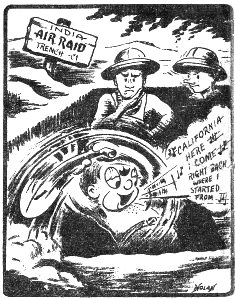
|
FOR MABEL
Souvenir shops, photographers, restaurants, do the main streets and soon Mabel in Alberquerque, Sadie in Milwaukee, and Agnes in Birmingham will be admiring photos of "my hero," all garbed up in some Indian paraphenalia, or possibly perched on a camel (Indian variety one or two humps).
Like State and Randolph in Chicago, India too has its rush hours and busy intersections, but whereas civilians still dominate the states, these six foot khaki shirted giants of Uncle Sam's predominate over the small, dark skinned, sashed and fezzed citizens of India. Passing down the street in a crowd, the doughboy can be spotted in a second, despite his latest taste for bush jackets, and various new monkey suits, which have been sanctioned here on foreign service. Some of the boys have a get-up hotter than the eight ounce "lurong" worn by Heddy Lamar in "White Cargo."
It won't be long before Uncle Sam's $60.00 buck privates will be wearing a coat of tan, that will really make the girls back at the Aragon and Trianon in Chicago, and Prospect Park in Brooklyn swoon with admiration, as the talcum powder complexion is rapidly a thing of the past.
Marching down a main street in India, is more like travelling down a business area in Tobacco Road, for between dodging donkey, and ox carts, camel caravans, horse and buggies and Sacred Cows, the soldiers have little time for a "Ben Lear Yoohoo" or a squint at a dark-eyed Indian lassy, passing here or there.
SACRED COWS
One thing the Yank can't conceive as yet, is the fact that the sacred Cows are allowed to prod the city's streets, tying up traffic, etc., while as yet he hasn't been able to find a "Greasy Spoon" or like in the way of a hamburger stand.
Come the advent of the Christmas season many of the faithful gals on the waiting list back home, will be donning sparklers on that third finger of the left hand, gifts from the land of the bed-sheet be-decked Mahatma Gandhi, and will be sure to tell everyone how Johnny has now promised never to look at another platinum blonde.... fact is Johnny can't locate a platinum blonde an all India, and his abstinance is due to even the lack of a blonde, henna variety.
Down Forty-second street and across Broadway with its glitter of a million lights to the Little Theater off Times Square, introduces to U.S. radio audiences over the ether waves, the First Nighter Program, coast to coast. Over the little fiver watter in Bombay or such Indian city, you might hear an altogether different procedure , with flashlights replacing neon lights, and whereas "first showings" predominate at the First Nighter, the 'Yank' is content to see the running of pictures from 1937 or 38.
LOCAL PICTURE
An evening's program at a local cinema might run something like this... Two shows, first at 7:30, second at 9:30 p.m., with seats selling at one rupee-eight, and two rupees. (About 45 and 60 cents a seat). For fifteen minutes preceeding the feature, phonograph records, the hottest usually available from the year before's hit parade, are played as loud as the machine will play, and the operator can stand it. Indians traverse up and down the aisles selling everything from soft drinks to peanuts and bananas, and again at a high climax in the movie, an intermission is held, when in South Chicago or brooklyn style, the vendors once again tramp through the aisles, and over that swollen corn on your left toe.
John Boles, the leading man, might have been in a romantic embrace with the heroine just before the intermission, or about to fall from a high parapit, but this makes no difference to the manager, who feels that the crackel of peanuts, aznd clinking of glasses only adds to the sound effects.... The newsreel for one night might consist of the Boy Scout jamboree 1937 in Washington, the marriage of Mary Pickford and Buddy Rogers, the screen's sweethearts at their wedding ceremony, or you might get a late flash from the invasion of Manchuria.
A comedy usually of Ben Turpin variety or Charlie Chase is shown at which the Indians nearly split a side laughing, and you nearly split a side laughing at the Indians laughing at a comedy which you saw in your high school days.
BEST MESS IN INDIA
By CORP. MEFFORD I. SWAN OF A BOMBER SQUADRON
It seems as though the American Soldier has almost the conveniences that he had at home. Of course walking a half a mile or so to the latrines does not seem like a convenience. But it is rumored that we have the best Mess in India. Incidentally the kitchen is more or less the calendar for us. Every Sunday evening we have fried chicken will all the trimmings. It need not be said that we are quite proud of the boys in the kitchen.
Our recreation facilities consist of a reading and game room, ping pong and music room and a room reserved for Church Services. The library has a fair collection of books; practically anything you want to read - if one is not too particular. Books ranging from "To Beg I Am Ashamed" to "Good Hindustani Self Taught." Needless to say, music lovers can be accomodated.
As for athletics we do fairly well. Naturally, baseball is the most popular sport. In addition to this we have horseshoe pitching, volleyball and last but not least our weekly 'Heel and Toe' races. The 'Heal and Toe' races affords plenty of competition and believe it or not some of those guys can walk! Why, it's rumored around that Lieut. Colonel Necrason, our Group Commander, has developed quite a pace in these walking races held weekly in this area. Some of the folks call him 'Speed' but the latest is 'Quicky.' He asked the Adjutant if he had heard the latest definition of a 'Quicky' - "One that double-parks in front of a - ." Well he did not finish so we failed to catch it too.
ADVERTISING IN MYSTERIOUS INDIA
Next to the Indian Rope Trick, we commend to American students of the occult the advertisement on the back page of Delhi-Simla Telephone Directory.
"A YEAR AGO TONIGHT I MARRIED HIM" is the intriguing caption of the advertisement of Jagat Narain and Sons, Manufacturing Jewelers, accompanied by a touching scene of domestic bliss. Continues the wife: "People said I was too young to settle down, and Surendra had not the means to support me in a way I am accustomed to live...
"I married him because I knew I would cheerfully bear all the discomforts of a small income... You see when we were married, he had very little to spend on jewelry - and since then I have been getting along with makeshifts and cheap ornaments.
HOME EARLY
"And tonight! Tonight, he came home early. "Many happy anniversaries darling," he said and handed me a package. When I saw what was in it I was so happy I got a lump in my throat. It was a pair of Jagat Narain's diamond bracelets."
How do these Indian husbands do it?
Jagat narain do not advertise their wares on any easy payment plan. Rupees one down, and one a week. Surendra apparently paid cash, or did he? There is no statement by this bride that her husband in one year became Sales Director or Plant Manager by enrolling for a course in the International Correspondence Schools, or that he so much as paved the way to success by reading a copy of How to Win Friends, etc.
HOW COME?
No! In one year on a small income, without the slighest suggestion of a raise or advancement, he showers the missus with a pair, mind you a pair, of diamond bracelets, and no Woolworth's but the supposedly quality merchandise of Jagat narain and Sons. Not a hint that he had won the factory World Series baseball pool or the Daily Double at Santa Anita. We wouldn't plant suspicion in the mind of this simple child bride for the world but gazing into our own personal crystal ball, we see Surendra on the eve of his anniversary armed with a short section of lead pipe on the corner of a dark alley waiting for the first lady to approach wearing an appealing pair of Jagat Narain's diamond bracelets. A lump in your throat, try pretty chicade? You should see the lump on the other lady's conk!
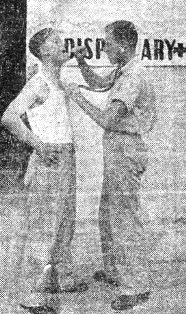 CALLED THE "Limey-American" by his American friends, Sgt. Fred Blackford, British Army N.C.O. serving on detached
service with the 10th Air Force as a radio operator, gets that old throat check by T/4 George M. Hall.
CALLED THE "Limey-American" by his American friends, Sgt. Fred Blackford, British Army N.C.O. serving on detached
service with the 10th Air Force as a radio operator, gets that old throat check by T/4 George M. Hall.
|
By CORP. JACK BLUMENFELD
"I'm in the Tenth United States Air Force, blimey!" Came the broad British accent of Sgt. Freddie Blackford. He was arguing with a policeman who was acting as intermediary in a Tonga quarrel. "I live at the American barracks" came from the boy whose stripes were turned upside down.
Sgt. Blackford, of a certain British regiment is attached as a radio operator to the Army Airways Communication Service Headquarters which is under the Tenth Air Force, and his only contact with the British is made on pay-day. He sleeps in A Bay with the other A.A.C.S. men (he is the only British boy in the Bay) and comes under all the regulations governing American soldiers in the barracks.
When American soldiers were restricted to the company area he had to stay within the walls too. Come inspection days, physical inspections included, Freddie will be there side by side with his American buddies. His best friends in New Delhi are Americans. Though he came to New Delhi with the A.A.C.S. 4 months ago, he has no British friends there.
"I would very much like to do a turn of 3 years in the American Army," says this British sergeant with 8½ years with the British Army already under his belt. "I would also like to visit the States when the war is over - all my American friends have invited me, and I'm sure that I would feel at home, just as I do in the American barracks."
"You know, M/Sgt. Crane let me take pictures of myself in his American uniform one day. I was so proud of the result that I immediately sent the photographs home to my parents."
"There's one thing that is bothering me, though. I've been rendering the American salute to your officers. I'm very much afraid that when I get back to the British Army I'll be giving British officers the American salute."

A FRIEND When on his way to battle You cheer him on his way You say he is a hero When in his grave he lay. The hardest battle of a soldier Is in the time of peace When people mock and scorn him And treat him like a beast. And with these few lines I will Close, and I hope, I don't offend - The next time you see a soldier Treat him as a friend. |
|
LETS PLAY TAPS FOR THE JAPS Let's play taps for the Japs and the Nazis, Let them know its time to say goodnight. Let's play taps for the Japs and the Nazis, But be certain to pull the curtain tight. For the only way they'll find they've made a blunder, Is when we shower them with hail and thunder, And Fascists lie together six feet under. Let's play taps for the Japs and the Nazis, Let them know its time to say goodnight. Let's play taps for the Japs and the Nazis, And the world will forever be all right. BUNDLES FOR? Twinkle, Twinkle, Little Star, Went a-parkin' in a car. What we did I ain't admittin' But what I'm knittin' Ain't for Britain. |
|
A SOLDIER'S PRAYER I recall with firm devotion, as I gazed down o'er the dead. A soldier's prayer to heaven, as his heart so freely bled. The field with dead and wounded, like seeds of nature sprayed. But like a shining martyr, he looked up to God and prayed. "Dearest Lord in heaven, please listen to my prayer. And bless my own my loved ones, so worried over there. A favor may I ask Thee, when you send you angel's there, Please tell them I've been loyal, Done my duty, knelt in prayer. And when my soul has left me, and my heart no longer throbs. Give courage to my loved ones, give them faith, heed their sobs." |
CHENNAULT DECORATES ALLISON WITH DSC
Somewhere in China - Brigadier General Claire L. Chennault this week handed decorations to four officers with the Distinguished Service Cross going to Major John F. Allison.
Allison shot down two Japanese bombers over Hengyang in the first night combat ny an American plane in China. It was also the first time a night bomber had been destroyed by a fighter plane during the entire Sino-Japanese war.
Chennault conferred the Distinguished Flying Cross on Capt. Alex Baumler for destroying two bombers in the same combat and the same decoration went to major David Hill for attacking Jap shipping during a raid on Kiukiang sinking ships with machine gun fire after his mission of escorting bombers had been completed.
Lieut. T. R. Smith received the Silver Star for shooting down a Jap observation plane in a 60-mile running battle which was his first air encounter. The action took place south of Chunking.
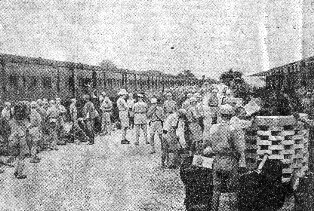 RAGGED HUNGRY, but with their tails up and those characteristic smiles on their faces the Chinese enetered
India from Burma, having fought their way out through the wilderness and terrific terrain which is Northern Burma
and Assam.
RAGGED HUNGRY, but with their tails up and those characteristic smiles on their faces the Chinese enetered
India from Burma, having fought their way out through the wilderness and terrific terrain which is Northern Burma
and Assam.
|
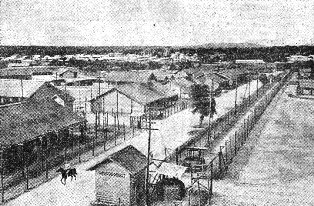 FROM ASSAM they were transported by train to an East Indian training area, which was once a British camp for
prisoners of war. Here the Chinese were quartered in comfortable brick barracks, hospitalized when necessary,
well fed and re-equipped.
FROM ASSAM they were transported by train to an East Indian training area, which was once a British camp for
prisoners of war. Here the Chinese were quartered in comfortable brick barracks, hospitalized when necessary,
well fed and re-equipped.
|
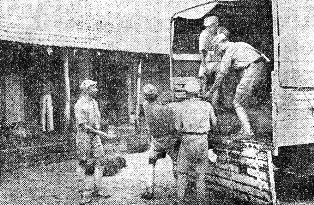 THEY MOVED INTO their barracks and settled down for what the future might hold in store with that
talkative, personable cheerfulness so characteristic of the Chinese.
THEY MOVED INTO their barracks and settled down for what the future might hold in store with that
talkative, personable cheerfulness so characteristic of the Chinese.
|
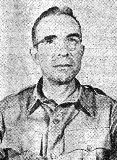 THERE WAS little time devoted to resting, however, as Col. Frederick McCabe had the responsibility of running a
training school with new American weapons and the Chinese were in remarkably good physical condition.
THERE WAS little time devoted to resting, however, as Col. Frederick McCabe had the responsibility of running a
training school with new American weapons and the Chinese were in remarkably good physical condition.
|
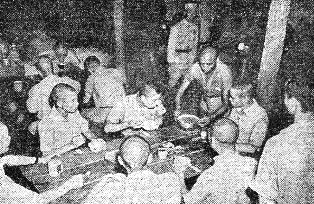 THE CHINESE are a frugal people not used to the Western ways of eating or over-eating. Their main diet is rice and
they can march and fight day after day on diets on which an American soldier would find it difficult to subsist.
THE CHINESE are a frugal people not used to the Western ways of eating or over-eating. Their main diet is rice and
they can march and fight day after day on diets on which an American soldier would find it difficult to subsist.
|
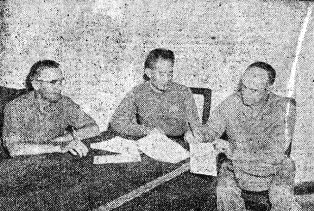 THE FIRST TRAINING and administration conference was held between Col. McCabe, General Sun, commanding the Chinese
troops in their heroic march to Burma, and Col. John A. MacLaughlin.
THE FIRST TRAINING and administration conference was held between Col. McCabe, General Sun, commanding the Chinese
troops in their heroic march to Burma, and Col. John A. MacLaughlin.
|
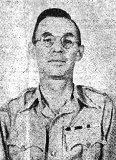 THE SUPPLY question was a tough one in that weapons, ammunition, food, clothing, had to be furnished a substantial
number of Chinese. Col. Henry Holcomb runs the S.O.S. and that detail at Ramgarh.
THE SUPPLY question was a tough one in that weapons, ammunition, food, clothing, had to be furnished a substantial
number of Chinese. Col. Henry Holcomb runs the S.O.S. and that detail at Ramgarh.
|
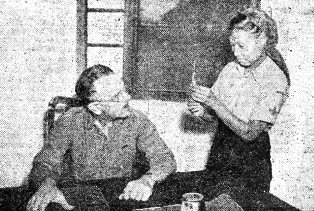 POSSIBLY THE GREATEST AUTHORITY on tropical medicine in the world today, Maj. Gordon S. Seagrave, was in command of
the station hospital ready to care for the newcomers. A former baptist Missionary, he is shown with one of his
Burmese nurses, Than Shwe.
POSSIBLY THE GREATEST AUTHORITY on tropical medicine in the world today, Maj. Gordon S. Seagrave, was in command of
the station hospital ready to care for the newcomers. A former baptist Missionary, he is shown with one of his
Burmese nurses, Than Shwe.
|
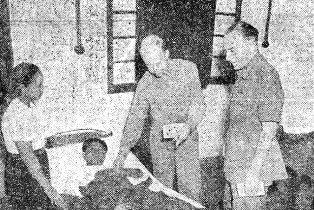 MAJOR GENERAL FRANKLIN C. SIBERT was the first high-ranking American Army officer to inspect the camp. He is
shown in the hospital with Ruth (most Burmese nurses with Christian names have only one), Capt. John H. Grindlay
and a Chinese patient.
MAJOR GENERAL FRANKLIN C. SIBERT was the first high-ranking American Army officer to inspect the camp. He is
shown in the hospital with Ruth (most Burmese nurses with Christian names have only one), Capt. John H. Grindlay
and a Chinese patient.
|
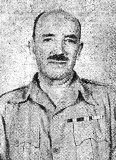 SIXTY PER CENT of the Chinese, all infantrymen when they arrived, are being trained as field artillerymen. Col.
George W. Sliney, who was awarded the Silver Star for heroism during the Burma campaign, runs the artillery school.
SIXTY PER CENT of the Chinese, all infantrymen when they arrived, are being trained as field artillerymen. Col.
George W. Sliney, who was awarded the Silver Star for heroism during the Burma campaign, runs the artillery school.
|
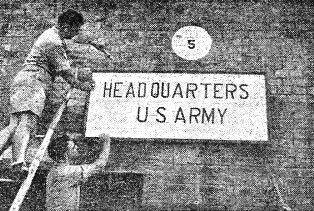 BEFORE THE CHINESE arrived the doughboys had moved in and got ready to receive their allies. Hanging up the sign
of the United States forces are Pvt. Abraham Lipschutz and Pvt. Dean Tanner.
BEFORE THE CHINESE arrived the doughboys had moved in and got ready to receive their allies. Hanging up the sign
of the United States forces are Pvt. Abraham Lipschutz and Pvt. Dean Tanner.
|
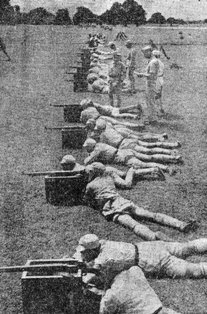 AMERICAN INSTRUCTORS are present at the camp to teach the Chinese how to handle American types of weapons with
which they were unfamiliar. They had their own rifles, brought out of Burma without a spot of rust, so they didn't
need any coaching there. Instructors are to remain with the Chinese in combat.
AMERICAN INSTRUCTORS are present at the camp to teach the Chinese how to handle American types of weapons with
which they were unfamiliar. They had their own rifles, brought out of Burma without a spot of rust, so they didn't
need any coaching there. Instructors are to remain with the Chinese in combat.
|
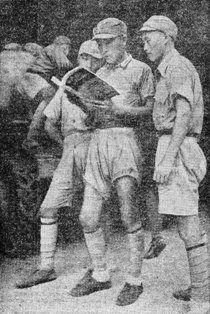 THE MOTOR SCHOOL at the camp is extremely popular with the Chinese soldiers. They all seem to enjoy learning how to
drive trucks. During the rains they had plenty of instructions about the hard way in the mud. Has the "Maintenance
Manual" got pictures or Chinese characters?
THE MOTOR SCHOOL at the camp is extremely popular with the Chinese soldiers. They all seem to enjoy learning how to
drive trucks. During the rains they had plenty of instructions about the hard way in the mud. Has the "Maintenance
Manual" got pictures or Chinese characters?
|
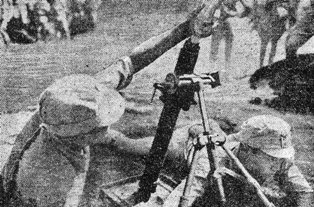 WITH THE 60 MM mortar, the Chinese were so remarkable that the class teacher stated after one day, "I'm going
home. They know more than I do." Their own Chinese mortar is larger, but they handle the American weapon like veterans.
WITH THE 60 MM mortar, the Chinese were so remarkable that the class teacher stated after one day, "I'm going
home. They know more than I do." Their own Chinese mortar is larger, but they handle the American weapon like veterans.
|
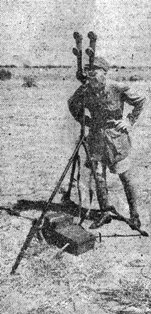 A CHINESE officer looks through a "BC" scope on an artillery observation point. He is watching shells bursting
on a target only a few hundred yards ahead. The accuracy of the boys from China on their first day of firing made
all the Yanks whistle with amazement.
A CHINESE officer looks through a "BC" scope on an artillery observation point. He is watching shells bursting
on a target only a few hundred yards ahead. The accuracy of the boys from China on their first day of firing made
all the Yanks whistle with amazement.
|
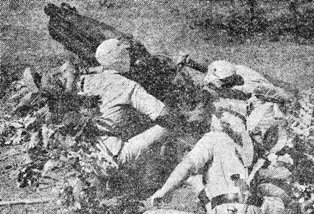 THE FIRST FIRING done with the 75 mm pack howitzer was done for edification of General Stilwell on an inspection
trip. He was impressed with the Chinese ability and with the smoothness with which the Americans and Chinese were
working together.
THE FIRST FIRING done with the 75 mm pack howitzer was done for edification of General Stilwell on an inspection
trip. He was impressed with the Chinese ability and with the smoothness with which the Americans and Chinese were
working together.
|
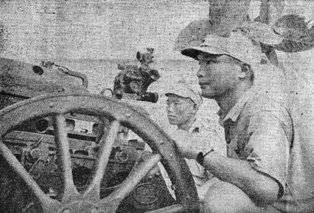 A LOT OF SUPERLATIVES have been used regarding the Chinese and their abilities, but the greatest surprise to all
came when the troops started firing 75 mm pack howitzers. Being all infantrymen, they probably had seldom seen an
artillery piece of this nature yet they bracketed their targets that first day like old campaigners.
A LOT OF SUPERLATIVES have been used regarding the Chinese and their abilities, but the greatest surprise to all
came when the troops started firing 75 mm pack howitzers. Being all infantrymen, they probably had seldom seen an
artillery piece of this nature yet they bracketed their targets that first day like old campaigners.
|
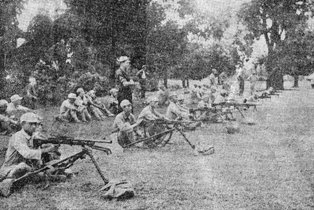 AMERICAN SERGEANTS who had been previously taught by the British, Instruct the Chinese in the use of the Brenn Gun.
Chinese ability with the mortar, automatic arms and artillery was considered astounding by hard bitten instructors.
AMERICAN SERGEANTS who had been previously taught by the British, Instruct the Chinese in the use of the Brenn Gun.
Chinese ability with the mortar, automatic arms and artillery was considered astounding by hard bitten instructors.
|
The C.B.I. Roundup is a weekly newspaper published by and for the men of the United States Army Forces in China, Burma, and India, from news and pictures supplied by staff members, soldier correspondents, Office of War Information and other sources. The Roundup is published Thursday of each week and is printed by The Statesman in New Delhi, India. Editorial matter should be sent directly to Capt. Fred Eldridge, Branch Office Hq., U.S.A.F.C.B.I., New Delhi, and should arrive not later than Monday in order to make that week's issue. Pictures must arrive by Sunday and must be negatives or enlargements. Stories should contain full name and organization of sender.

OCTOBER 8, 1942
Original issue from the collection of C.B.I. Roundup Correpondent Al Sager, shared by CBI veteran Dave Dale.
Copyright © 2006 Carl Warren Weidenburner. All rights reserved.
SEE A PORTION OF THE ORIGINAL
TOP OF PAGE PRINT THIS PAGE ABOUT THIS PAGE SEND COMMENTS
PREVIOUS ISSUE CLOSE THIS WINDOW NEXT ISSUE